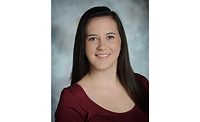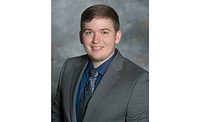Student of the Month: Brooke Payne

Name: Brooke Payne
Degree Being Sought: Polymer Science
Undergrad Degree and Institution: Polymer Science, University of Southern Mississippi
Research Group: Morgan Research Group
Area of Study: Polymer Science
Hometown: Union, MS
Give a brief synopsis of research/work being done
Current research involves synthesizing anionic, acrylamide-based polymers via aqueous reversible addition-fragmentation chain transfer polymerization (aRAFT) for determination of structure/binding interactions with the protein gliadin and other food-based proteins. Gliadin is a component within gluten that triggers the irregular T-cell response causing deterioration of the small intestines in celiac disease (CeD) patient. In order to address this condition, further understanding of the polymer/protein binding interactions within the CeD biological process is needed.
From your current perspective, what do you see as an ideal fit for your skills, goals and career moving forward?
At USM, I have gained a fundamental understanding in polymer synthesis in both academic to laboratory settings. With this knowledge, I plan to pursue a Ph.D. in Chemistry with a focus in Material Chemistry. Being in a research group at USM has given me transferable skills that I will utilize in graduate school. After graduate school, I plan to lead a team in product development/manufacturing within the biotechnology industry.
An interesting (personal) fact about yourself
I grew up on a small farm where in high school I fed the farm animals and gathered the new chicken eggs before class. My favorite goat’s name was Jenny.
Why did you choose USM?
Since I was 5, one could find me cheering on the Golden Eagles at the Rock and dreaming of one day being able to cheer them on in the student section. Both my grandparents and parents attended the University of Southern Miss and have now been inducted into the University’s Hall of Fame. By attending USM, I hope to fulfill the Payne legacy at USM as well as be the first to graduate from the nationally recognized Polymer Science Program that USM has to offer.
What USM-related scholarships did you receive?
(2016-2017) Phi Theta Kappa Scholarship - top academic distinction offered at junior colleges that provides academic scholarship to senior colleges
(2016-2018) Transfer Scholar - an academic scholarship awarded on the basis of academic achievement and record of leadership at a community college.
Awards won
2016-Phi Theta Kappa Graduate top academic distinction offered at ECCC.
(2016-2018) Honors College, Keystone Scholar. Will receive Latin distinction upon graduation after completing a comprehensive exam and undergraduate thesis.
(2015) Freshman Chemistry Award, awarded by chemistry professor to student with the highest overall grade average in General Chemistry I and II, ECCC
(2014-2016) HOSA Scholarship - Placed 1st in state for Biomedical Debate that resulted in a scholarship, ECCC
(2014-2016) Presidential Scholarship - awarded to select students who have demonstrated high academic achievement and leadership skills, ECCC
(2014-2016) ACT Scholarship awarded to students with a 27 or above on ACT, ECCC
(2016-2017) Polymer Science Scholarship - an academic scholarship awarded by Polymer Science faculty to an outstanding student majoring in Polymer Science Scholar Athlete Award, ECCC
Who or what influenced your USM education the most?
I am very fortunate to have joined a supportive research group that has given me excellent role models who have greatly assisted my development as a scientist. I can always rely on my research group to lift me up as I prepare for an exam or for an important deadline and to always give encouragement.
What are your plans for next year and beyond?
I plan on attending graduate school to pursue a Ph.D. in a polymer or chemistry-related field. I plan to continue an offshoot of the research completed from my senior thesis project where I plan to look at antimicrobial polymer mimics at the surfaces and interfaces of protein-based disorders.
While at USM, what other accomplishments/activities are you most proud of?
My proudest research accomplishment was achieving an internship at the University of California, Irvine (UCI) working for Dr. Rachel Martin. While at UCI, I characterized a protein from the carnivorous plant, Drosera capensis, and found that it was capable of undergoing vesicle fusion with bacteria and yeast lipids, thus proving that the protease had antimicrobial characteristics.
My proudest nonacademic activity has been being a part of the Polymer Science Association outreach team, which enabled me to be a guest lecturer and share my experiences in Polymer Science local community college in order to encourage higher STEM education.
What was one of your greatest challenges attending USM?
My greatest challenge was adjusting to a large university where I did not know everybody on campus. I graduated high school with a class of 60 students and graduated with my Associates in Science from a small junior college, so I am used to always knowing everyone on campus. Upon transferring, I had to quickly adjust to a larger scale. However, I soon found the Polymer Science program as its own small subsection of USM where everybody in the program is very close net. The polymer science program at USM is its own little family.
Looking for a reprint of this article?
From high-res PDFs to custom plaques, order your copy today!






